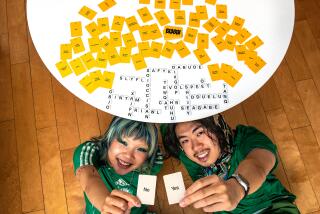The vicissitudes of the National Spelling Bee
My husband loves words like “leister.” It’s a seven-letter word, conferring a 50-point bonus on a Scrabble player, that’s made up of common letters in the game’s universe of tiles. So are its anagrams “sterile” and “retiles,” of course, but you can add an “s” to leister, if there happens to be a spare one on the board.
But what does it mean?* At such questions, most tournament-level Scrabble players will do what my husband does -- shrug. Who cares what it means? That’s not what Scrabble is about.
Spelling-bee champions have a lot in common with Scrabble players. They might not have the same command of all the three-letter words in the Scrabble dictionary, or have impressed on their memories the anagrams for all the common combinations of letters, but the purpose of the spelling bee has been the formal arrangement of letters in the right order, not the meaning of the resulting word.
The Scripps National Spelling Bee -- the biggie of them all -- is about to change that. In the elimination rounds, contestants also will be judged on their ability to define words, or at least pick out the definition from a multiple-choice question.
“It represents a deepening of the bee’s commitment to its purpose,” Director Paige Kimble told USA Today, “to help students improve their spelling, increase their vocabularies, learn concepts and develop correct English usage that will help them all their lives.”
Monosyllabically speaking: Aw, come on. The bee has always been a show of amazing memorization skills, not of enhanced vocabulary. It has nothing to do with concepts, except the concept of kids working their brains off committing long lists of long words to memory. Correct English usage? Please.
If that’s what the bee were really about, the judges would have the students write flowing essays in response to a prompt, and grade the students on their use of varied and appropriate vocabulary. But that wouldn’t make for a dramatic show; in fact, the finals will still feature spelling only.
What the new addition will do is make competitors drive themselves even crazier in the months beforehand, committing not only words but dictionary definitions to memory. And, yes, that will be an impressive feat, but it will have little in common with enhanced vocabulary and varied expression.
Last year’s winner, USA Today reports, won by correctly spelling the word “guetapens,” which is a sort of snare or trap, a word so uncommon that if you look up Google images for it, you’ll see almost solely photos of the teen who won the award and almost nothing having to do with a snare.
It’s also too long to bother learning for Scrabble.
*A spear used for catching fish, especially salmon.
ALSO:
Early help for L.A.’s early voters
More to Read
A cure for the common opinion
Get thought-provoking perspectives with our weekly newsletter.
You may occasionally receive promotional content from the Los Angeles Times.











